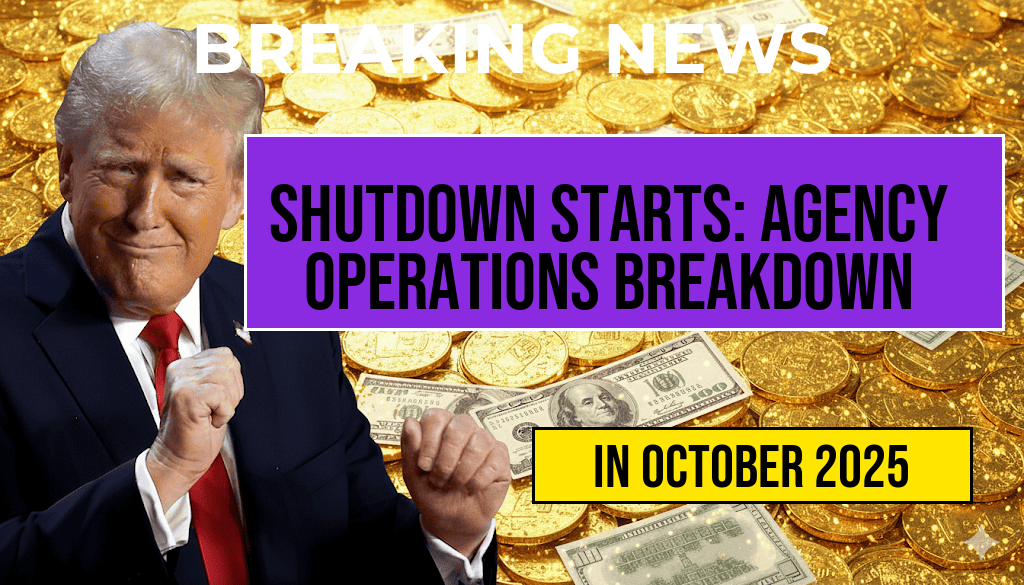The federal government has officially entered a shutdown following the expiration of appropriations legislation without new funding measures in place. As agencies halt or scale back operations, the impact varies widely across departments, with some functions continuing with essential personnel, while others cease entirely. Among the most affected are the Social Security Administration, Internal Revenue Service (IRS), Defense Department, and Transportation Security Administration (TSA). The shutdown raises concerns about disruptions to social services, security screenings, military readiness, and federal licensing, prompting millions of Americans to brace for delays and cancellations. This article provides a detailed agency-by-agency breakdown, explaining which government functions are still operational and which have been temporarily halted or scaled back amid the funding lapse.
Overview of the Shutdown Impact
The shutdown stems from a failure to pass a continuing resolution or new appropriations bill before the fiscal deadline. As a result, many federal agencies have had to implement contingency plans, with a significant portion of their workforce furloughed. Agencies deemed non-essential have suspended services, while those considered critical continue to operate, often with reduced capacity. The immediate effects are felt across social programs, national security, public safety, and economic management, with some services remaining available to the public while others experience delays or complete closures.
Key Agencies and Their Operational Status
Social Security Administration
- Status: Operating with limited functions
- Impact: Routine benefit payments, including Social Security and Supplemental Security Income (SSI), are scheduled to continue without interruption. However, processing of new claims, inquiries, and administrative functions are delayed due to staff furloughs.
- Note: The SSA has indicated that despite the shutdown, beneficiaries will still receive their payments on time, but new applications and customer service operations may face delays.
Internal Revenue Service (IRS)
- Status: Major operations suspended
- Impact: Most taxpayer services, including assistance and correspondence processing, are halted. Some critical functions, such as processing refunds related to certain tax credits, may continue temporarily, but the agency’s ability to handle audits and enforcement actions is limited.
- Note: Tax filing deadlines remain unchanged, but taxpayers may experience delays in refunds and correspondence responses.
Defense Department
- Status: Continuing essential functions
- Impact: Military personnel on active duty remain on duty, with paychecks scheduled to be issued. However, civilian employees face furloughs, affecting administrative, logistical, and support services.
- Note: National security operations continue, but non-essential activities, including training exercises and administrative projects, are postponed.
Transportation Security Administration (TSA)
- Status: Fully operational
- Impact: TSA agents continue screening at airports, ensuring security protocols remain intact. Funding for TSA staffing and operations is secured through existing airport fees, preventing disruptions in passenger screening.
- Note: Travelers should expect regular security procedures, but potential delays in other federal transportation programs may occur.
Other Agencies and Services
| Agency | Status | Comments |
|---|---|---|
| Environmental Protection Agency (EPA) | Limited activities | Fieldwork and enforcement activities are suspended; essential air and water quality monitoring continue in some regions. |
| Federal Emergency Management Agency (FEMA) | Operational | Continuing disaster response and recovery efforts; administrative functions scaled back. |
| U.S. Postal Service | Operational | Mail delivery continues as USPS is an independent agency funded through postage and fees. |
| Department of Homeland Security (DHS) | Mixed | Core security functions remain active, but administrative and grant-related work is reduced. |
Public and Economic Implications
The shutdown’s ripple effects threaten to disrupt everyday life and economic stability. Social Security recipients will continue to receive benefits, but delays in processing new claims and inquiries could lead to customer service backlogs. Taxpayers may face delays in refunds and correspondence from the IRS, complicating financial planning. Meanwhile, military operations persist, but civilian support staff face furloughs, potentially hampering logistical and administrative functions.
Travelers should prepare for normal airport security, but some transportation projects and infrastructure inspections might be delayed. Federal contractors and grant recipients face uncertainty, with many projects postponed until funding is restored. The shutdown also underscores the fragility of the federal budget process, with lawmakers now under pressure to reach a funding agreement to prevent further disruptions.
Looking Ahead
Lawmakers remain engaged in negotiations, aiming to resolve funding disagreements swiftly. While the immediate shutdown impacts essential services like TSA security and active-duty military operations, many government functions are temporarily halted or slowed. Future decisions about reopening agencies depend on legislative action, with congressional leaders facing mounting pressure from constituents and industry stakeholders to find a resolution that minimizes disruption.
For ongoing updates, citizens are advised to consult official agency websites and trusted news sources. The situation remains fluid, with potential for a swift resolution or a protracted impasse depending on political negotiations.
Frequently Asked Questions
What agencies are affected by the government shutdown?
The government shutdown impacts various agencies, including Social Security, IRS, Defense, and TSA. Some agencies continue to operate, while others face closures or limited services.
Which essential services will continue during the shutdown?
Essential services such as TSA screenings at airports, military operations, and social security payments are expected to continue, ensuring public safety and basic support remains unaffected.
How will the shutdown affect Social Security payments?
During the government shutdown, Social Security payments are typically still issued on schedule, as the program is funded independently of ongoing federal appropriations.
What is the impact on the IRS and tax services?
The IRS may experience delays in processing returns and issuing refunds, as many non-essential employees are furloughed. However, some critical functions related to tax enforcement and compliance may continue minimally.
When will agencies reopen after the shutdown ends?
The reopening of agencies depends on congressional action to pass funding bills. Once a funding agreement is reached, agencies will begin the process of restoring full operations.





